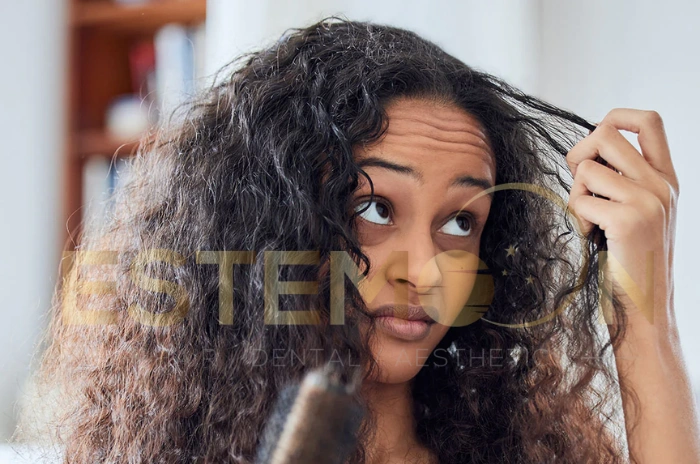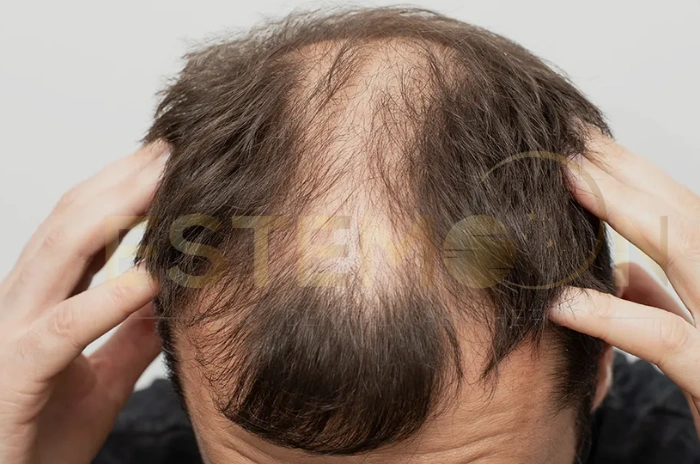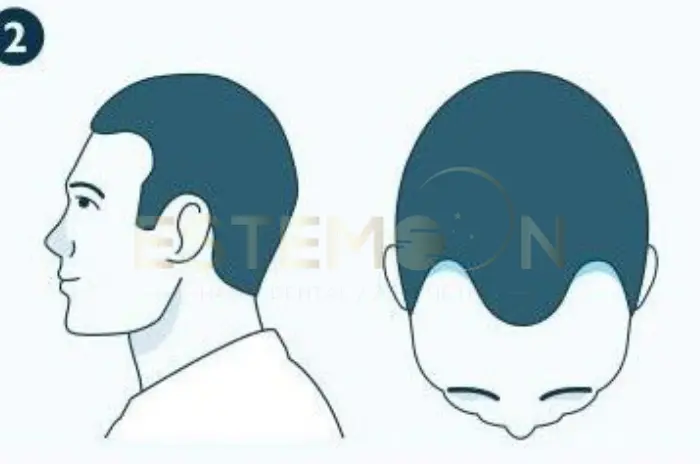Dealing with frizzy hair can be frustrating, especially when you’re trying to achieve a sleek, polished look. Whether your hair becomes unmanageable in humid weather or seems to have a mind of its own, understanding the root causes and implementing effective solutions can transform your hair care routine. This comprehensive guide will explore proven methods to tame frizz and achieve the smooth, healthy hair you’ve always wanted.
From natural home remedies to professional treatments, there are numerous approaches to combat frizzy hair. The key lies in understanding your hair type, identifying the underlying causes, and selecting the right combination of products and techniques that work for your specific needs.
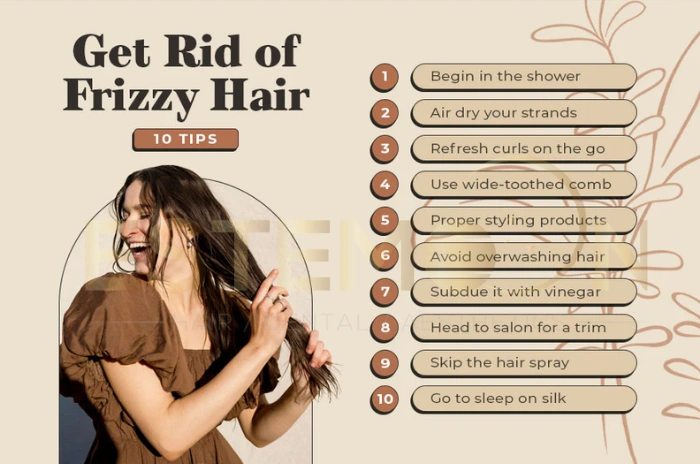
What causes frizzy hair and why it happens
Frizzy hair occurs when the hair cuticle becomes raised, allowing moisture to enter the hair shaft and causing it to swell. This disruption in the hair’s natural structure creates the characteristic fuzzy, uneven texture that many people struggle with.
Several factors contribute to frizz formation. Humidity is one of the most common culprits, as it causes hair to absorb excess moisture from the environment. When hair is damaged from chemical treatments, heat styling, or harsh brushing, the protective cuticle layer becomes compromised, making it more susceptible to frizz.
Genetics also play a significant role in hair texture and frizz tendency. People with naturally curly or wavy hair often experience more frizz because the irregular shape of their hair strands makes it difficult for natural oils to travel down the hair shaft, leading to dryness and increased porosity.
Other contributing factors include:
- Over-washing, which strips natural oils
- Using products with harsh sulfates and alcohol
- Sleeping on cotton pillowcases that create friction
- Aggressive towel drying
- Lack of regular deep conditioning treatments
Choosing the Right Products for Frizzy Hair
Selecting appropriate products for frizzy hair is crucial for maintaining smooth, manageable locks. The foundation of any effective frizz-fighting routine starts with a gentle, sulfate-free shampoo that cleanses without stripping essential oils.
Look for shampoo for frizzy hair that contains moisturizing ingredients like glycerin, ceramides, or natural oils. These formulations help maintain the hair’s moisture balance while preventing further damage to the cuticle layer.
Conditioners should be rich and nourishing, containing ingredients such as:
- Silicones (dimethicone, cyclomethicone) for smoothing
- Proteins (keratin, silk amino acids) for strengthening
- Natural butters (shea, cocoa) for deep moisturizing
- Hyaluronic acid for humidity protection
Leave-in treatments are essential for providing ongoing protection throughout the day. Choose lightweight formulas that won’t weigh your hair down while offering frizz control and heat protection.
When selecting styling products, opt for cream-based formulas over gel-based ones, as they provide better moisture retention and create a smoother finish. Anti-humidity sprays can be particularly beneficial for those living in humid climates.
Natural Oils and Their Role in Taming Frizz
Natural oils for frizz have been used for centuries to nourish and smooth hair. These botanical treatments work by filling in gaps in the hair cuticle and creating a protective barrier against environmental factors.
Argan oil for frizzy hair is particularly effective due to its lightweight texture and high concentration of vitamin E and fatty acids. This Moroccan oil penetrates the hair shaft easily, providing deep nourishment without leaving a greasy residue. Apply a few drops to damp hair, focusing on the mid-lengths and ends.
Coconut oil for frizz control offers exceptional moisturizing properties and has been scientifically proven to reduce protein loss in hair. Its molecular structure allows it to penetrate the hair shaft more effectively than many other oils. For best results, use it as a pre-shampoo treatment or apply small amounts to dry hair as a finishing touch.
Jojoba oil closely mimics the hair’s natural sebum, making it an excellent choice for all hair types. It helps regulate oil production while providing lightweight moisture and shine.
Other beneficial oils include:
- Sweet almond oil for softening and detangling
- Olive oil for deep conditioning damaged hair
- Marula oil for antioxidant protection
- Rosehip oil for color-treated hair
Daily care habits to prevent frizzy hair
Developing consistent daily habits to prevent frizz is essential for maintaining smooth, manageable hair. Your routine should focus on minimizing damage while maximizing moisture retention.
Start with gentle detangling using a wide-tooth comb on wet hair, beginning at the ends and working your way up to the roots. Never brush wet hair with a regular brush, as this can cause breakage and increase frizz.
When washing, use lukewarm water instead of hot, as excessive heat can strip natural oils and raise the hair cuticle. Apply shampoo primarily to the scalp and let the suds cleanse the lengths as you rinse.
After washing, gently squeeze excess water from your hair using a microfiber towel or cotton t-shirt. Avoid aggressive rubbing, which creates friction and disturbs the cuticle layer.
Apply leave-in treatments to damp hair, focusing on the areas most prone to frizz. Use a heat protectant before any styling to prevent thermal damage.
Consider these additional daily practices:
- Sleep on silk or satin pillowcases to reduce friction
- Use a humidifier in dry environments
- Protect hair from sun exposure with UV-filtering products
- Avoid touching or playing with your hair throughout the day
- Regular trims every 6-8 weeks to remove damaged ends
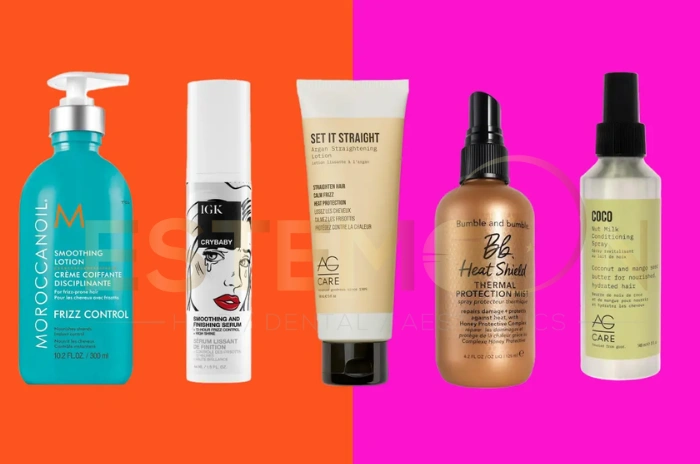
Products that can help reduce frizz
Professional frizzy hair treatments and specialized products can provide significant improvement for those dealing with persistent frizz issues. Understanding which formulations work best for your hair type will help you build an effective routine.
Protein treatments are beneficial for damaged hair that lacks structural integrity. These products temporarily fill in gaps in the hair cuticle, creating a smoother surface and reducing frizz. However, use them sparingly to avoid protein overload, which can make hair brittle.
Deep conditioning masks should be used weekly to provide intensive moisture and repair. Look for formulations containing:
- Hydrolyzed proteins for strengthening
- Ceramides for cuticle repair
- Natural oils for deep nourishment
- Moisture-binding ingredients like glycerin
Anti-frizz serums and creams work by coating the hair shaft with smoothing agents that repel humidity and create a protective barrier. Apply these products to damp hair for best results.
Professional treatments like keratin smoothing or Brazilian blowouts can provide long-lasting frizz reduction, typically lasting 3-4 months. These treatments work by temporarily altering the hair’s structure to create a smoother appearance.
Effective Frizzy Hair Solutions for Your Shower Routine
Your shower routine plays a crucial role in frizzy hair solutions and sets the foundation for smooth, manageable hair. The way you cleanse, condition, and treat your hair in the shower can significantly impact frizz levels throughout the day.
Temperature control is essential when addressing how to stop frizz during showering. Use lukewarm water for the majority of your wash, as hot water swells the hair cuticle and strips natural oils. Finish with a cool rinse to help seal the cuticle and lock in moisture.
Pre-shampoo treatments can provide extra protection for severely damaged or frizzy hair. Apply a natural oil or conditioning treatment to dry hair before shampooing to create a protective barrier and prevent over-cleansing.
When shampooing, focus on the scalp rather than the lengths of your hair. Use gentle, massaging motions and avoid piling hair on top of your head, which can create tangles and increase frizz.
Conditioning techniques are crucial for frizz prevention:
- Apply conditioner from mid-length to ends, avoiding the roots
- Use a wide-tooth comb to distribute product evenly
- Leave conditioner on for the recommended time
- Rinse thoroughly with cool water
Consider incorporating these shower routine enhancements:
- Weekly deep conditioning treatments
- Clarifying shampoo once a month to remove buildup
- Hair masks targeting specific concerns
- Scalp treatments to maintain healthy hair growth
FAQs About Get Rid of Frizzy Hair With Treatments and Remedies
What are the main causes of frizzy hair?
The main causes of frizzy hair include humidity, damaged hair cuticles from chemical treatments or heat styling, genetics, over-washing, and using harsh hair products with sulfates.
Which natural oils are best for taming frizz?
Argan oil for frizzy hair, coconut oil for frizz control, jojoba oil, and sweet almond oil are among the most effective natural oils for reducing frizz and adding moisture.
What are the best daily habits to prevent frizz?
The best daily habits to prevent frizz include using a wide-tooth comb on wet hair, sleeping on silk pillowcases, avoiding hot water when washing, and applying leave-in treatments to damp hair.
How do you stop frizz during showering?
To stop frizz during showering, use lukewarm water, focus shampoo on the scalp, apply conditioner from mid-length to ends, and finish with a cool rinse to seal the hair cuticle.
Follow us on social media for updates, tips, and patient success stories:

